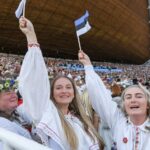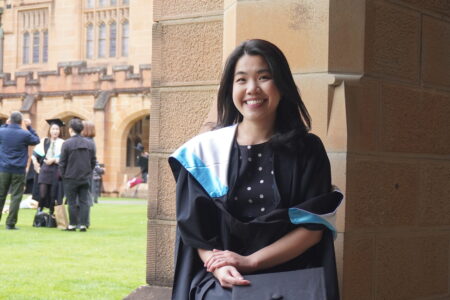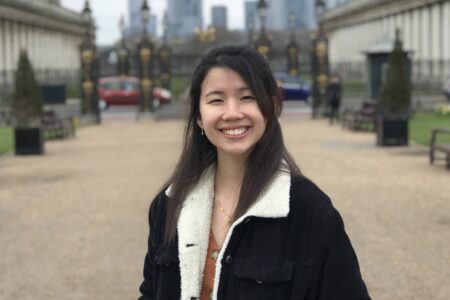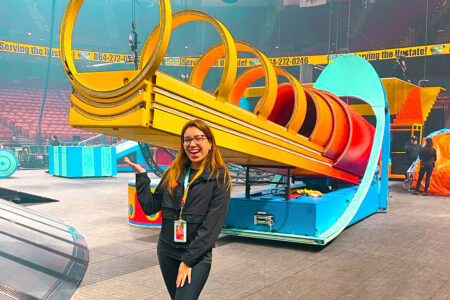
Ana María González Ángel never imagined spending her 30s in the US. Still, that is what can happen when one pursues higher education. For Dr. González Ángel, that time culminated in two master’s degrees and a PhD, and helped shape her career in the same country.
Dr. González Ángel spent her childhood and adolescence in Colombia, where she was born, and in the US and Spain. Upon completing her high school education, she enrolled on the BS in Biology programme at the University of the Andes in Bogota, Colombia.
“I love that biology explains how organisms work, and I remember being the only kid in my high school class who loved biology,” says Dr. González Ángel.

Dr. González Ángel’s passion for biology has brought her around the globe. Source: Ana María González Ángel
Her first job out of university was with the Colombian government. It was a policy research role within the now Ministry of Science, Technology, and Innovation, and while it exposed her to the inner workings of science policy, it was not a great fit for her career goals.
“I was very young back then, and I didn’t have a lot of exposure to all the myriad types of jobs that you can do as a biologist,” says Dr. González Ángel. “Until then, I thought I would either go into academia and continue studying or work for the government. But after giving policy research a try, I decided to try something new.”
Having lived abroad as a child, Dr. González Ángel knew she wanted to experience another country as an adult. With that, she sent in her master’s application worldwide and ultimately received approval to enrol at Florida’s Nova Southeastern University for their MS programme in Marine Biology.
That marked the start of her decade in the US.

Dr. González Ángel earned her PhD in Biology at The Pennsylvania State University. Source: Ana María González Ángel
How to spend 10 years studying and working in the US
Dr. González Ángel’s master’s took two years to complete. Thanks to a fellowship she gained during the programme, she could pursue her studies in the US further, this time with a PhD in Biology at The Pennsylvania State University.
The doctoral work took six years to complete and it ended right before COVID-19 shut the world down.
At that point, Dr. González Ángel, like many other foreigners, faced an unexpected challenge. Suddenly, there were no more flights back home to Colombia, and she needed a way to stay in the US legally.
From January to April 2020, data obtained by the Cato Institute from Customs and Border Protection (CBP) showed that of the 17 million US air departures required to occur during those months, only 10.9 million occurred. About 6.1 million foreigners were unexpectedly stranded due to COVID-19.
Luckily for Dr. González Ángel during this period, she gained a work permit under her student visa, allowing her to overcome one of the many problems that had arisen for recent international graduates during the COVID-19 pandemic.
At first, Dr. González Ángel’s work involved teaching a basic biology class at Penn State. After that, she packed up her two doggies, Paco and Lula, and moved coasts to take up an administrative position in a research lab at the University of California, Berkeley.
“I did not necessarily want to continue a research career,” she says. “I was happy helping others; and so, when the possibility to support academic researchers arose at UCB, I decided to take it.”

Sometimes, life is about putting in your pieces in a game of Connect 4 and hoping you find the win condition. Source: Ana María González Ángel
But things were not so golden on the Golden Coast; while the work was something Dr. González Ángel had an interest in, she encountered an unexpected circumstance, a hostile work environment that led her to move on to different horizons.
“The job itself wasn’t very hard, but it was a difficult experience; my predecessor lasted 5 months and the person before her lasted 3,” recalls González Ángel. “Because of that, I became very aware about the importance of having a healthy workplace and knowing where to find the tools and resources needed to face challenges.”
Fortunately, Dr. González Ángel’s transitioned to a scientist position in the biotechnology and genomics industry.
Back to a technical position, her job was to help clients with array genotyping and clinical whole genome sequencing – work that leveraged her steadfast passion and comprehensive education in biology. Between that and a significantly better workplace environment, Dr. González Ángel was thriving.
The job satisfaction ignited a desire for Dr. González Ángel to push her career growth further into business. While her master’s and PhD degrees taught her how to be a skilled scientist, they did not equip her with the business acumen she needed to continue her professional growth.
One 18-month Master’s of Business Administration from the United States University later, Dr. González Ángel was more confident navigating her career than ever.
Unfortunately, following common practice among the biotechnology industry companies, just one year into her programme, Dr. González Ángel’s company eliminated her position despite favourable performance reviews in one of the numerous layoffs they have had since 2022.

Dr. González Ángel pictured exploring San Diego during her MBA studies. Source: Ana María González Ángel
The hardships of finding job happiness as a foreigner
Most MBA graduates end up with a salary boost, a clearer direction of their future, or at least, more career opportunities to explore. But, by the end of her MBA, Dr. González Ángel had been laid off and her visa was on the line. Despite multiple job applications and interviews, nothing was bearing fruit.
While there had been an initial rush to turn her student visa into something more permanent like an H1-B visa (a visa that allows US employers to hire foreign workers in so-called specialty occupations) and later an O1 visa (a nonimmigrant visa for people with extraordinary abilities or achievements in certain fields), the moment Dr. González Ángel’s role was terminated, not much could be done as foreigners rely on their employer to sponsor a work visa.
It was a massive blow for Dr. González Ángel.
“I loved my job. I was very happy there and I could see myself growing in the company,” she says.
This setback, however, was also the motivation for Dr. González Ángel to take matters into her own hands and apply for a green card – the permanent resident card that gives a person the right to live and work indefinitely without restrictions.
“My logic for applying for the green card was that I’d spent a decade in the US establishing a scientific career, and I finally found a place and industry – the genomics industry – where I love working,” says Dr. González Ángel. “And if I want to meaningfully contribute in this field, the US is the best place to be.”
But the application process isn’t an easy or short one. Currently, Dr. González Ángel is waiting to hear if she can proceed with applying for the green card after submitting her National Interest Waiver – a petition allowing certain foreign nationals to get a US green card without a job offer or labour certification.
This step alone, according to Dr. González Ángel, will take around 16 months to complete due to the existing backlog of cases on the US government’s hands.
That, on top of the constant stream of rejections to her job applications due to companies – in the US and outside of it – being unwilling to sponsor her a work visa, has led Dr. González Ángel to call a temporary pause and to return home to Colombia.

Not all setbacks are bad – some give you the opportunity to catch your breath and relax back home before you hop back on your feet. Source: Ana María González Ángel
‘Taking things one thing at a time’
Perhaps a positive way that Dr. González Ángel is looking at her situation is that none of the past 10 years were planned long-term.
“I took things one thing at a time. I never went to the US with a plan of staying. I started with a master’s degree and from there I was able to build on that degree and begin the scientific career I had first imagined in Colombia,” she says.
That, however, doesn’t take away the sting of disappointment of how things turned out.
One conversation with a friend from high school helped put things into a better perspective, though.
The friend Dr. González Ángel spoke with had never left Colombia – choosing to settle into her life in their home country instead.
“I told her what had happened, and she was like, ‘It was your goal to go overseas to study, and now you have three degrees from abroad, so you accomplished your goals,’” shares Dr. González Ángel. “And she was right.”
In another conversation with a friend from her undergraduate days, Dr. González Ángel also noticed that she had begun speaking business when the topic of a business idea came up.
“My MBA learnings kicked in – I was talking to him about the aspects of running a business – and I realised that this was a conversation I wouldn’t have had two years ago before my MBA,” she says.
It was those conversations that helped Dr. González Ángel conclude that her time spent abroad had its worth and value.

Wherever she’s headed next, Dr. González Ángel knows her previous experience will help guide her well. Source: Ana María González Ángel
Overall, these experiences have made Dr. González Ángel very resilient and broadened her outlook on what can be accomplished with her learnings.
“We have a Spanish saying that goes ‘nadie te quita lo bailado,’ which means no one can take away what you’ve danced,” shares Dr. González Ángel. “What has happened has already happened; I had good and bad experiences, and I couldn’t have known if I hadn’t taken the chance. So nobody can take away what I danced.”
Armed with this truth, Dr. González Ángel feels more prepared to face the new dance that comes her way.
“You can’t plan for life, but I do plan to find fulfilment in my professional and personal life, and that can be found anywhere.”










